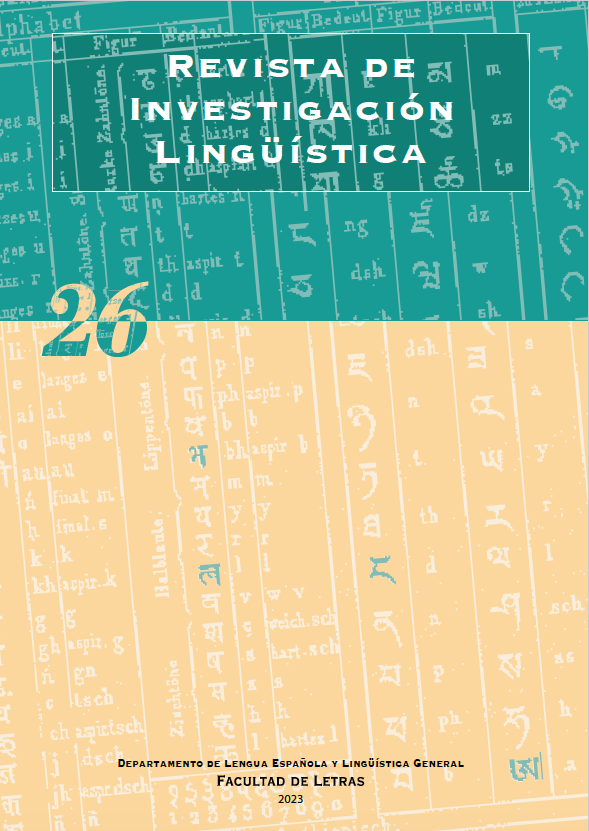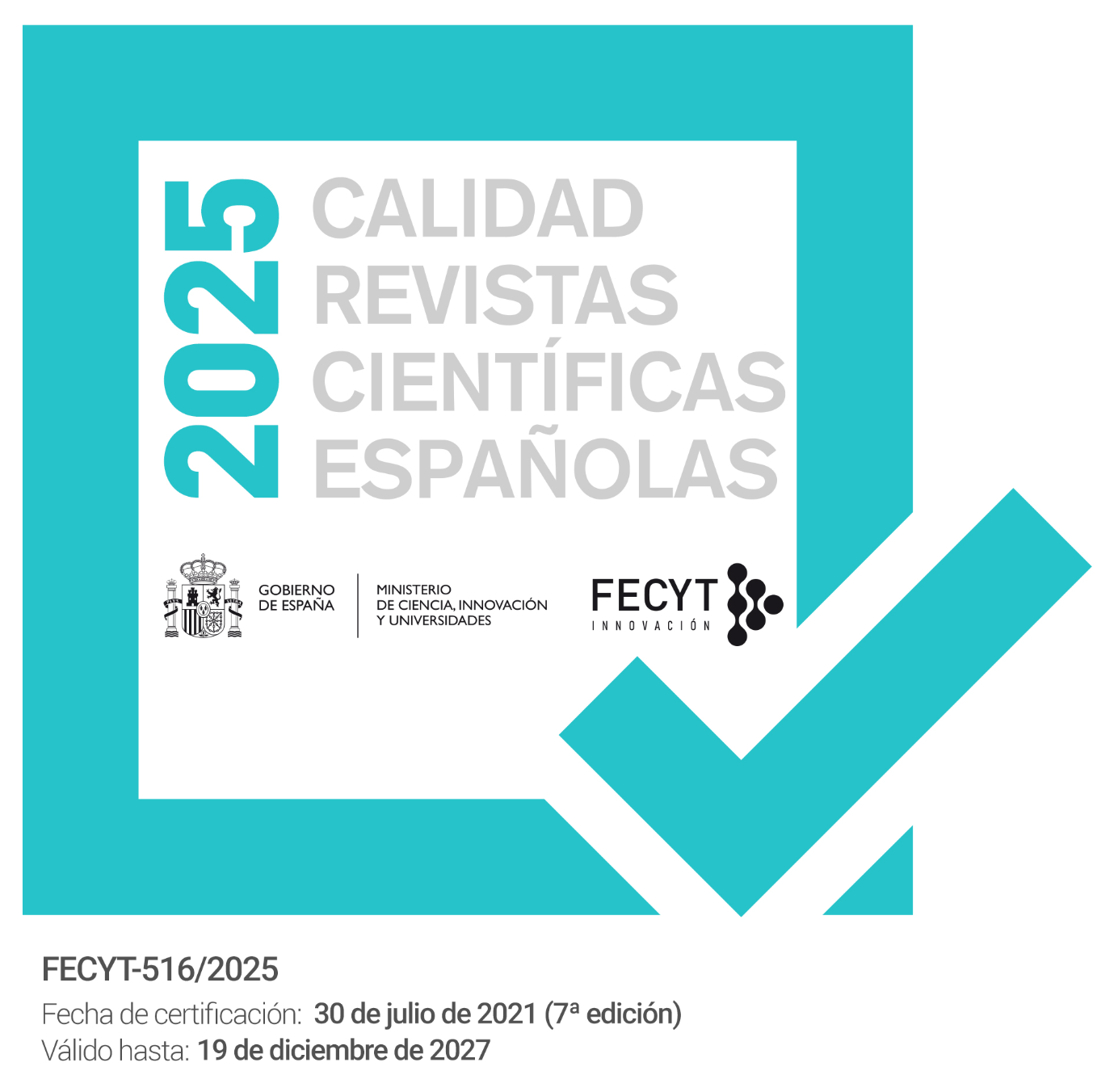La noción de cultura subyacente al determinismo/relativismo lingüístico
Resumen
La relación lengua-cultura es un tópico recurrente en la reflexión filosófica, lingüística y antropológica. Entre los acercamientos teóricos al problema se encuentran el determinismo y relativismo lingüístico, según los cuales la lengua tiene un rol fundamental en la conformación de la visión del mundo de los hablantes. Este trabajo analiza la noción de cultura que subyace a las premisas del determinismo/relativismo lingüístico, para lo cual comprende estas como ideologías lingüísticas.
Se considera que estas perspectivas se sustentan en una visión ahistórica de la lengua y la cultura, invisibilizando su naturaleza dinámica y heterogénea, aunque el relativismo lingüístico resulta más flexible a este respecto. En consecuencia, se aprecia que el determinismo lingüístico se asocia a una visión clásica o descriptiva de cultura, mientras que el relativismo lingüístico puede considerarse compatible tanto con la concepción descriptiva de cultura como con la simbólica.
Descargas
-
Resumen1045
-
PDF720
Citas
ABOUCHAAR, Alberto (2012): «Contra el hablante/oyente ideal y la ideología del monolingüismo», Forma y Función, 25(2), pp. 85-97. En línea: <https://revistas.unal.edu.co/index.php/formayfuncion/article/view/39832> [13/02/2023].
ANDERSON, Benedict (1991[1983]): Imagined communities. Reflections on the origins and spread of nationalism, Londres, Verso.
BLANCO, Antonio (2017): La relatividad lingüística (variaciones filosóficas), Madrid, Akal.
BORODITSKY, Lera (2001): «Does language shape thought?: Mandarin and English speakers’ conceptions of time», Cognitive Psychology, 43, pp. 1-22. DOI: https://doi.org/10.1006/cogp.2001.0748
CHOMSKY, Noam (1957): Syntactic structures, La Haya, Mouton. DOI: https://doi.org/10.1515/9783112316009
CHOMSKY, Noam (1959): «Review of Verbal behavior by B. F. Skinner», Language, 35(1), pp. 26-58. DOI: https://doi.org/10.2307/411334
CHOMSKY, Noam (1965): Aspects of the theory of syntax, Cambridge, MIT Press.
CISTERNAS, César (2019): «La ideología del relativismo lingüístico en el debate por la revitalización del mapudungún», Lenguas y Literatura Indoamericanas, 21, pp. 1-25. En línea: <https://revistas.ufro.cl/ojs/index.php/indoamericana/article/view/2522> [13/02/2023].
COADY, Ann (2018): «The origin of sexism in language», Gender and Language, 12(3), pp. 271-293. DOI: https://doi.org/10.1558/genl.31445
CUCHE, Denys (2002[1966]): La noción de cultura en las ciencias sociales, Buenos Aires, Nueva Visión.
DEUTSCHER, Guy (2010): Through the language glass. Why the world looks different in other languages, Nueva York, Metropolitan Books.
FISHMAN, Joshua (1982): «Whorfianism of the third kind: ethnolinguistic diversity as a worldwide societal asset (the Whorfian hypothesis: varieties of validation, confirmation, and disconfirmation II)», Language in Society, 11, pp. 1-14. DOI: https://doi.org/10.1017/S0047404500009015
FISHMAN, Joshua (2001): «Why is it so hard to save a threatened language?», en Joshua Fishman (ed.), Can threatened languages be saved?, Clevedon, Multilingual Matters, pp. 1-22.
GEERTZ, Clifford (2003[1973]): La interpretación de las culturas, Barcelona, Gedisa.
IRVINE, Judith (1989): «When talk isn’t cheap: language and political economy», American Ethnologist, 16(2), pp. 248-267. DOI: https://doi.org/10.1525/ae.1989.16.2.02a00040
IRVINE, Judith y Susan GAL (2000): «Language ideology and linguistic differentiation», en Paul Kroskrity (ed.), Regimes of language: Ideologies, polities, and identities, Santa Fe, School of American Research Press, pp. 35-84.
KONISHI, Toshi (1993): «The semantics of grammatical gender: a cross-cultural study», Journal of Psycholinguistic Research, 22, pp. 519-534. DOI: https://doi.org/10.1007/BF01068252
KROEBER, Alfred y Clyde KLUCKHOHN (1952): Culture. A critical review of the concepts and definitions, Cambridge, Harvard University.
LINDQVIST, Anna, Emma RENSTRÖM y Marie GUSTAFSSON (2019): «Reducing a Male Bias in Language? Establishing the Efficiency of Three Different Gender-Fair Language Strategies», Sex Roles, 81, pp. 109-117. DOI: https://doi.org/10.1007/s11199-018-0974-9
MAJID, Asifa, Melissa BOWERMAN, Sotaro KITA, Daniel HAUN y Stephen LEVINSON (2004): «Can language restructure cognition? The case for space», Trends in Cognitive Sciences, 8(3), pp. 108-114. DOI: https://doi.org/10.1016/j.tics.2004.01.003
MAKIHARA, Miki (2004): «Linguistic syncretism and language ideologies: transforming sociolinguistic hierarchy on Rapa Nui (Easter Island)», American Anthropologist, 106(3), pp. 529-540. DOI: https://doi.org/10.1525/aa.2004.106.3.529
MCWHORTER, John (2014): The language hoax. Why the world looks the same in any language, Nueva York, Oxford University Press.
MYHILL, John (2003): «The native speaker, identity, and the authenticity hierarchy», Language Sciences, 25, pp. 77-97. DOI: https://doi.org/10.1016/S0388-0001(01)00023-7
PINKER, Steven (1999[1994]): El instinto del lenguaje. Cómo crea el lenguaje la mente, Madrid, Alianza Editorial.
REYNOSO, Carlos (2014): Lenguaje y pensamiento. Tácticas y estrategias del relativismo lingüístico, Buenos Aires, SB Editorial.
SARZURI-LIMA, Marcelo (2012): «De la palabra al texto: colonialidad lingüística y luchas interculturales», Revista Integra Educativa, 5(1), pp. 59-85. En línea: <http://www.scielo.org.bo/scielo.php?script=sci_arttext&pid=S1997-40432012000100003> [13/02/2023].
SCHLEE, Günther (2015): «Language and ethnicity», en James Wright (ed.), International encyclopedia of the social and behavioral sciences, 2.a ed., vol. 13, Ámsterdam, Elsevier, pp. 251-255. DOI: https://doi.org/10.1016/B978-0-08-097086-8.53054-2
SERA, Maria D., Chryle ELIEFF, James FORBES, Melissa CLARK BURCH, Wanda RODRÍGUEZ y Diane Poulin DUBOIS (2002): «When language affects cognition and when it does not: an analysis of grammatical gender and classification», Journal of Experimental Psychology, 131, 3, pp. 377-397. DOI: https://doi.org/10.1037/0096-3445.131.3.377
SILVERSTEIN, Michael (2000): «Whorfianism and the linguistic imagination of nationality», en Paul Kroskrity (ed.), Regimes of language. Ideologies, polities, and identities, Santa Fe, SAR Press, pp. 35-138.
SWIM, Janet, Robyn MALLETT y Charles STANGOR (2004): «Understanding subtle sexism: detection and use of sexist language», Sex Roles, 51(3-4), pp. 117-128. DOI: https://doi.org/10.1023/B:SERS.0000037757.73192.06
SWINEHART, Karl y Kathryn GRABER (2012): «Tongue-tied territories: Languages and publics in stateless nations», Language & Communication, 32(2), pp. 95-97. DOI: https://doi.org/10.1016/j.langcom.2011.05.007
TAYLOR, Charles (2016): The language animal. The full shape of the human linguistic capacity, Cambridge, Harvard University Press. DOI: https://doi.org/10.4159/9780674970250
THOMPSON, John (1998[1990]): Ideología y cultura moderna. Teoría crítica social en la era de la comunicación de masas, 2.a ed., México D.F., Universidad Autónoma Metropolitana.
TYLOR, Edward (1975[1871]): «La ciencia de la cultura», en Joel Kahn (ed.), El concepto de cultura: textos fundamentales, Barcelona, Anagrama, pp. 29-46.
VON HUMBOLDT, Wilhelm (1988[1836]): On language. The diversity of human language-structure and its influence on the mental development of mankind, Cambridge, Cambridge University Press.
VON TREITSCHKE, Heinrich (1975[1894]): The history of Germany in the nineteenth century, Chicago, University of Chicago Press.
VOSSLER, Karl (1957[1923]): Filosofía del lenguaje. Ensayos, Buenos Aires, Losada.
WEBER, Max (2001[1906]): Ensayos sobre metodología sociológica, Buenos Aires, Amorrortu.
WEBER, Max (1964[1925]): Economía y sociedad. Esbozo de sociología comprensiva, 2.a ed., México D. F., Fondo de Cultura Económica.
WHORF, Benjamin (1956a[1936]): «A linguistic consideration of thinking in primitive communities», en John Carroll (ed.), Language, thought, and reality. Selected writings of Benjamin Lee Whorf, Cambridge, The M.I.T. Press, pp. 65-96.
WHORF, Benjamin (1956b[1941]): «Language, mind, and reality», en John Carroll (ed.), Language, thought, and reality. Selected writings of Benjamin Lee Whorf, Cambridge, The M.I.T. Press, pp. 246-270.
WINAWER, Jonathan, Nathan WITTHOFT, Michael FRANK, Lisa WU, Alex WADE y Lera BORO-DITSKY (2007): «Russian blues reveal effects of language on color discrimination», Proceedings of the National Academy of Sciences, 104(19), pp. 7780-7785. DOI: https://doi.org/10.1073/pnas.0701644104
YULE, George (2020): The study of language, 7.a ed., Cambridge, Cambridge University Press.
ZENKER, Olaf (2014): «Linguistic relativity and dialectical idiomatization: language ideologies and second language acquisition in Irish language revival of Northern Ireland», Journal of Linguistic Anthropology, 24(1), pp. 63-83. DOI: https://doi.org/10.1111/jola.12037
Derechos de autor 2023 Revista de Investigación Lingüística

Esta obra está bajo una licencia internacional Creative Commons Atribución-NoComercial-SinDerivadas 4.0.
Las obras que se publican en esta revista están sujetas a los siguientes términos:
1. El Servicio de Publicaciones de la Universidad de Murcia (la editorial) conserva los derechos patrimoniales (copyright) de las obras publicadas, y favorece y permite la reutilización de las mismas bajo la licencia de uso indicada en el punto 2.
2. Las obras se publican en la edición electrónica de la revista bajo una licencia Creative Commons Reconocimiento-NoComercial-SinObrasDerivadas 4.0 (texto legal). Se pueden copiar, usar, difundir, transmitir y exponer públicamente, siempre que: i) se cite la autoría y la fuente original de su publicación (revista, editorial y URL de la obra); ii) no se usen para fines comerciales; iii) se mencione la existencia y especificaciones de esta licencia de uso.
3. Condiciones de auto-archivo. Se permite y se anima a los autores a difundir electrónicamente las versiones pre-print (versión antes de ser evaluada) y/o post-print (versión evaluada y aceptada para su publicación) de sus obras antes de su publicación, ya que favorece su circulación y difusión más temprana y con ello un posible aumento en su citación y alcance entre la comunidad académica. Dulcinea: verde. OPF.










